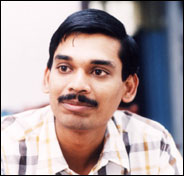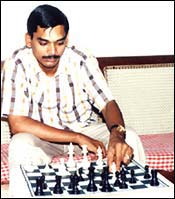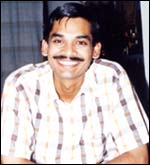The Rediff Interview / R B Ramesh
'Becoming the British Open champion is not a joke'
When the organisers of the Smith and Williamson British Open chess championship invited some leading Indian players to participate in their tournament they were quite hopeful that an Englishman would win the prestigious title. That despite giving the top billing to Indian Grandmaster Krishnan Sasikiran. So, it came as a shock to everyone when an unknown Indian, named R B Ramesh, who was only seeded 26th in the championship, played some spectacular chess to emerge triumphant.
 The 26-year-old International Master had entered the Indian chess scene with a lot of promise, winning the IM norm at the age of 19. However, after that, he became an also-ran as more and more youngsters -- including the extremely talented Sasikiran and Abhijit Kunte -- arrived on the scene with a bang. In fact, Ramesh found it difficult to even qualify for the Indian team several times. However, there's been a turnaround in his fortunes in the last year or so. With the All India Chess Federation organising camps and engaging the help of chess experts like Evgeny Vladimirov, players like Ramesh, who did not have the luxury of a coach at home, benefited a lot.
The 26-year-old International Master had entered the Indian chess scene with a lot of promise, winning the IM norm at the age of 19. However, after that, he became an also-ran as more and more youngsters -- including the extremely talented Sasikiran and Abhijit Kunte -- arrived on the scene with a bang. In fact, Ramesh found it difficult to even qualify for the Indian team several times. However, there's been a turnaround in his fortunes in the last year or so. With the All India Chess Federation organising camps and engaging the help of chess experts like Evgeny Vladimirov, players like Ramesh, who did not have the luxury of a coach at home, benefited a lot.
The effect was visible at the British Open chess championship. Ramesh finished in style, tallying 8.5 points, and collected the title, while Sasikiran and defending champion Grandmaster Joseph Gallagher of Switzerland gathered eight points to tie for the second place.
For Indian chess, it was a great championship, with Ramesh winning the title and world junior champion Koneru Humpy regaining the ladies crown, which she won in 2000.
After returning from England, a beaming Ramesh talked to Shobha Warrier about the ups and downs in his career and the recent triumph.
Your triumph in the British Open chess came as a surprise to many. What about you?
Of course, I myself was surprised, pleasantly though. I didn't expect to win the championship; my aim was to get a GM norm there. But once I got the norm, I realised I had a chance! I am really happy that I won.
You didn't do that well in the earlier rounds, but you were unstoppable in the final four rounds. What was the inspiration behind such a splendid show towards the end?
After I defeated GM Barua and GM Abhijit Kunte in consecutive rounds with black and white respectively, I got my nine-round GM norm. Till I got the norm, I was a bit nervous because a GM norm had been eluding me for a long time. Though getting a GM norm was not that difficult, I came so close several times in the last two years but it slipped from my hands. I didn't want it to happen this time too. After the first round loss to [Pendyala] Harikrishna, I was really nervous. I could score only 2.5 points in the first four rounds.
Then, we had a rest day. After the rest day, I won both the games, against Barua and Kunte.
What did you do on the rest day?
I was not feeling well, so I took some medicines and slept the whole day. It was quite relaxing, and I think it really helped. After the rest day, I won four games in a row. Actually, after getting the GM norm, my confidence level grew.
Your performance in China was not that good, was it not?
Yes. I played the tournament in China [which was won by Sasikiran) before the British Open, and I lost a game, won a game and drew seven games. So, my winning ratio was very minimal. But at the British Open, out of the 11 games, I could win seven lost just one and drew three. Probably, I took more risks in England.
You got your IM norm at the age of 19, but after that there was a drought. Why?
See, many of the friends I had at that time, who belonged to my generation and my earlier generation, were IMs. Their ambition in those days was to become an International Master as soon as possible, that is, if at all it was possible, and once you become an International Master, the aim was to be in the top six in the country as long as possible. So, I was also tuned to that ambition level, and nothing more than that. I never aspired to become a Grandmaster.
In those days, we didn't have as many opportunities as you have these days. There was only one tournament and it was the Goodricke tournament which comes every February, and that was the only opportunity we could hope for. And they used to invite very strong GMs from other countries, whom we could not even dream of beating and making a norm. So, we never thought it was possible for an Indian to become a Grandmaster.
What about [Vishwanathan] Anand?
See, Anand was in a different class. So we accepted the fact that this was our limitation. We really didnít aim beyond that.
After us came the generation of Sasikiran and Abhijit Kunte. Harikrishna came much later and he is a kid! Sasikiran and Kunte were closer to my generation, and these guys took a lot of risks and spent money from their pockets and went to play foreign tournaments, which we never thought was a sound proposition. They took such calculated risks and got their GM norms.
 So, that was the turning point?
So, that was the turning point?
Yes, that was the turning point. We then realised that it was not necessary for us to wait for the tournaments to come to us but we should go for it. These youngsters started overtaking us. Then, we started going abroad.
Unfortunately for me, after the AICF started getting very good support from the Government of India, and started sending the top six from the country every year to play major tournaments abroad, I was out of the top six. I was number 7 or 8, and one year, I didn't even qualify for the National A. So, those two years were very bad for me.
In the 1999 Nationals, I was, in fact, leading, ahead of Sasikran, and I had a very good chance of coming first or, at the most, second. When I needed only two draws in the last two tournaments, I lost both the games and, in the end, finished eighth. Only the top six were sponsored by the Government of India to go abroad.
I was left out that way. I didn't get any funds or support at that time. I was just a tiny officer in Indian Oil Corporation.
Players like Anand, Sasikiran, etc have chosen chess as a profession but you chose to work elsewhere. Was it also one of the reasons why you couldn't come up?
It could be a reason. After my 12th, I was offered a job in Indian Bank, because I was doing really well then. If I had taken a decision to play chess as a profession, I would have become a Grandmaster by 21! But for reasons beyond my control, I couldn't push myself. When I got a better offer from Indian Oil Corporation, I decided to switch the job.
It was only by the end of 2000 that I realised that I was waiting too long. I had wasted both 1999 and 2000 without doing anything. It delayed my progress. So I decided to go abroad on my own. My father helped me a lot; I used my own savings and with the money I got from a couple of tournaments here went abroad.
I played around 10 tournaments in Europe and in all of them I achieved the norms or came close to it. I would say, my performance outside India was fantastic compared to what I have done inside India. I missed the norm only by half a point or one point several times.
Was it because you were not mentally strong?
I had psychological problems. I didn't have confidence in myself. It took some time for me to believe in myself. I myself doubted my ability. I thought I was not good enough. See, I couldn't even qualify for the Indian National Championship. I didn't get any proper guidance at that time.
I even consulted a psychiatrist once to help me professionally. Then, I realised that it should come from me, and I started motivating myself.
In what way?
I used to tell myself that I can also do it! The thing is, I used to work very hard from a very young age. Whether my results are good or bad, I continue working hard.
Was it not frustrating for you when the results did not match the way you worked?
It was very, very frustrating. It was very difficult to overcome the frustration. I know many players who don't work hard but get good results. Once I started taking the right initiative, results improved. I used to play very fast earlier. At a young age, it used to be a very big advantage, because the average age of the top players in those days was 35! I was supposed to be a kid at that time even though I was 19. So, my speed game used to unsettle my opponents. But once they got used to my play, it became my weakness. Now, I make a conscious effort to control my game and play slowly.
Which would you rate as your best game at the British Open? The last round game against GM McShane of England?
It was memorable one, but I consider the game against Abhijit Kunte was my best... where I beat him in 26 moves with white pieces. It was crucial for me as I got my GM norm after the game.
In the last round against McShane, I was not really hoping for a win because there was a clause in the tournament that if two or more players tie for the top place, there would be a tie-break. I was playing with black pieces in the final round, and it is a disadvantage when you are playing against a better player. So, I hoped for a draw that day. I was prepared to play in the tie-break. But he was playing for a win because it was more prestigious for him. The audience there didn't want an Indian to win the tournament. He was under pressure because I was an Indian and he, British. I played a new move and offered him a draw but he declined. Finally, I won.
What was your first reaction when you knew that you were the champion?
 I was delighted, just delighted!
I was delighted, just delighted!
After the penultimate round, which I won, I was coming out and Barua asked me, 'What are you going to do tomorrow?' I asked, "What do you mean? I am going to play, that's all." He continued, 'If you enter the tie-break, what are you going to do?'
It was only then I realised, I had a chance to go for a tie-break and win the championship. Till then, I hadn't even thought about it. I usually think only about my next game, and not more than that. So, I was going for a draw and then a tie-break. At one point, I started thinking, maybe, I am going to win, and that made me nervous. Becoming the British Open champion is not a joke. I am not even an Indian national champion. From then on, I slowed down my pace.
After the win, when I came out of the room, I saw the faces of the audience. All of them looked so glum and dejected. Somehow, I felt they still have it in the back of their minds that they ruled us and so they are better people than usÖ even the organisers did not come forward to congratulate me.
But all the Indians came and lifted me. I felt really great. Leave alone myself, even others also could not believe it!
How was the award function?
It was a grand ceremony in a big stadium. In fact, all of us had booked our tickets for the 10th morning. I had to cancel my tickets and stay back to collect the award. Another player, Aarthie Ramaswamy, also stayed back with me.
I was given the cup at the ceremony, but after that, they came to me and said, the cup needed some touching! It is a rolling trophy. I think they didn't want the cup to go away from England.
Does it put pressure on you now that you are the British Open champion?
It makes a lot of difference. I think I will have to play like a champion now!
Also read:
Ramesh wins British Chess Championship
Photographs: SREERAM SELVARAJ
More interviews